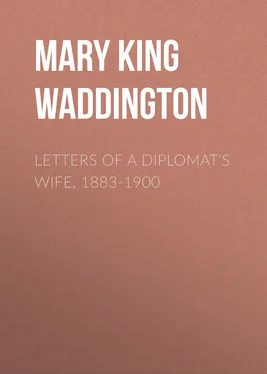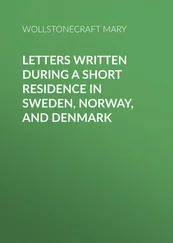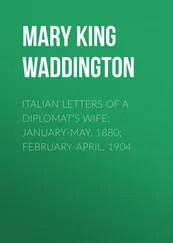Mary Waddington - Letters of a Diplomat's Wife, 1883-1900
Здесь есть возможность читать онлайн «Mary Waddington - Letters of a Diplomat's Wife, 1883-1900» — ознакомительный отрывок электронной книги совершенно бесплатно, а после прочтения отрывка купить полную версию. В некоторых случаях можно слушать аудио, скачать через торрент в формате fb2 и присутствует краткое содержание. Издательство: Иностранный паблик, Жанр: Биографии и Мемуары, История, foreign_edu, foreign_antique, foreign_prose, на английском языке. Описание произведения, (предисловие) а так же отзывы посетителей доступны на портале библиотеки ЛибКат.
- Название:Letters of a Diplomat's Wife, 1883-1900
- Автор:
- Издательство:Иностранный паблик
- Жанр:
- Год:неизвестен
- ISBN:нет данных
- Рейтинг книги:3 / 5. Голосов: 1
-
Избранное:Добавить в избранное
- Отзывы:
-
Ваша оценка:
- 60
- 1
- 2
- 3
- 4
- 5
Letters of a Diplomat's Wife, 1883-1900: краткое содержание, описание и аннотация
Предлагаем к чтению аннотацию, описание, краткое содержание или предисловие (зависит от того, что написал сам автор книги «Letters of a Diplomat's Wife, 1883-1900»). Если вы не нашли необходимую информацию о книге — напишите в комментариях, мы постараемся отыскать её.
Letters of a Diplomat's Wife, 1883-1900 — читать онлайн ознакомительный отрывок
Ниже представлен текст книги, разбитый по страницам. Система сохранения места последней прочитанной страницы, позволяет с удобством читать онлайн бесплатно книгу «Letters of a Diplomat's Wife, 1883-1900», без необходимости каждый раз заново искать на чём Вы остановились. Поставьте закладку, и сможете в любой момент перейти на страницу, на которой закончили чтение.
Интервал:
Закладка:
I was glad to walk up and down a little—one gets cramped sitting so long, even with our outings for food, which are frequent. The tea is extremely good always, a sort of greenish flavour, but very delicate, and I should think very strong. Pontécoulant showed me Monsieur Philippe in the distance, talking and gesticulating, evidently considering himself a most important feature of the Mission—also the detective, who looks like an amiable well-to-do bourgeois travelling for his pleasure, until you meet his eyes, and there is a quick, keen look which tells you he is very much on the alert. He has again just given W. the pleasing piece of information that all the well-known Nihilist leaders will be at Moscow.
Hubert came up and says the horses are quite well—their rest at Berlin did them good. He is very much impressed with the absolute solitude of the country—"pas de villages—pas de barrières, pas même de chemins." We have also a telegram from M. Lhermite saying the house is quite in order, he and his cooks and attendants installed, and he will have breakfast ready for us to-morrow morning. We arrive about 8. We must be ready early, as they say the approach to Moscow is very fine. It stands low in a plain, but one sees the gilt domes and coloured steeples from a great distance.
Our engineer tells us the railway officials are out of their minds. He says the special envoys—Princes particularly—change their minds and their routes all the time. They all have special trains, and the confusion will be something awful. The Hessian Prince is just ahead of us. We haven't crossed many trains, and yet there must be frequent communication between Varsovie and Moscow.
I still feel rather in a dream, but not tired. I must stop now as it is nearly eleven—my next letter will be from Maison Klein, Malaia Dimitrofska, Moscow. Richard came in just now, and we have been talking over our future—Russia is a "terra incognita" to all of us. It has been certainly most novel and interesting so far. Just now we stopped for a few moments at a little station, quite alive with people and lights, as of course trains are going all night. The people look so different—generally fair, with flat features, and a repressed look, as if they had always been kept down.
This long effusion will go early to-morrow morning, as they send off a valise at once from Moscow.
To H. L. K
We arrived quite safely and comfortably yesterday morning—34 people, counting servants, policemen, etc. I hadn't time to write, but you will have had the Havas telegram announcing our arrival. I am writing in my little boudoir, which looks on a large, square, light courtyard, and I wish you could see the wild confusion that reigns there. Quantities of boxes and "ballots" of every description. Mdme. Hubert, with a veil tied over her head, struggling to get at some of my trunks, which are all marked with an enormous M. K. W. in white letters (a private mark, so as not to confound them with the general mark of the Mission). Leroy, Hubert, and Pontécoulant trying to get the big carriage cases opened (they look like small houses). Sesmaisons and Calmon fussing over their saddles, which they apparently had got without much difficulty—quantities of Russian helpers working, talking, but not loud, nor yelling to each other. How anything will ever come out of all that chaos I don't know.
However, I must begin at the beginning. We got here about 8.30 yesterday morning. We were all up early, as the country grew more interesting as we approached Moscow. We had a confused vision of gilt domes, high coloured steeples, etc., but nothing stood out very distinctly. There was a fine confusion at the station—quantities of officials, all in uniform, detachments of soldiers, red carpets, etc. We were not received officially, not being Princes. The Mission only exists here after they have presented their lettres de créance. We found our consul, Lagrené, waiting for us, several members of the French Colony, and Lhermite. We drove off at once to our Ambassade. The main street, Tverskaya, looked very gay with quantities of flags and draperies in every direction, and even at that time in the morning a great many people. Our house looks well—the entrance isn't bad, and the staircase marble, handsome. I hardly looked at the reception-rooms, as I was anxious to get to mine. Lhermite had done them very well, quite as I wanted, and a nice-looking woman, Russian of course, the femme de charge left in the house, was there to see if everything was right.
I washed off a little dust, got a cup of tea, and then went with W. and Pontécoulant to inspect the house. The ballroom, "serre," and 3 drawing-rooms are nice; the dining-room small in comparison and low. Not a breath of air anywhere, double windows, hermetically sealed, with one pane opening in each; so the very first thing we did was to send for someone to take down the extra window, and open everything wide—the close smell was something awful. The femme de charge was astounded, and most unwilling. I think she thought we wished to demolish the whole establishment. W. has a large room opening out of the drawing-room. Pontécoulant took charge of the distribution of the gentlemen's rooms (which wasn't easy, as they were generally small, and not particularly comfortable, but I must say they were all easy going, and not at all inclined to make difficulties). He chose a room down-stairs for himself next the Chancellerie, which he has arranged at once very well. The ballroom is handsome, a parquet floor, and yellow satin furniture; the other drawing-rooms too are well furnished in silk and satin. The dining-room is small, but the serre will make a very good fumoir where the gentlemen can sit and smoke. It has nice cane arm-chairs and tables, and will be a resource.
I went back to my own rooms and arranged my affairs with the maids. There is a large room, half lingerie, half débarras, upstairs, with good placards and closets where I can put my dresses if I ever get hold of them. They must be unpacked at once, particularly the velvet dresses. Of course I am always at the window. My Dear, how it would amuse you, so absolutely unlike anything you have ever seen.
The men seem to work well enough—they all wear red flannel shirts tucked into their trousers, and high boots—at the present moment they are all gaping at the horses, who certainly do look enormous (the Russian horses are all small). It seems ours stand the cannon, and shouting, and waving flags and draperies very well (so the lessons in the École Militaire, where they were taken several times after they arrived in Paris to have cannons and guns fired close to their heads, and flags waved about, did them good).
A little Russian maid, in a red petticoat, and a blue handkerchief tied over her head, has just appeared, and I suppose will be a sort of fille de chambre. She smiles every time I speak to the maids, and watches every movement I make. I moved a fauteuil just now, and in an instant she had possession of it, and stood over it looking at me hard to see where I wanted it put. I daresay we shall get on very well. We breakfasted at 12.30 all together—a very good breakfast, flowers on the table, and everything most correct. The gentlemen were amusing, all giving their experiences. Just as we were finishing we heard someone coming, with the clank of sabre, and those long, heavy spurs the Russians wear; and a good-looking officer, Colonel Benckendorff, who was attached to our Embassy, appeared. He will never lose sight of us now until the ceremonies are over.
We adjourned to the serre, and he put us au courant of everything. He told us the crowd and confusion at the Kremlin was indescribable (all the foreign Princes are lodged there). He had all sorts of papers, invitations, audiences, cartes de circulation, etc. W. is to present his lettres de créance and all the Mission en grande tenue at 10.30 to-day. (I am waiting now to see them start.) W. has just been in, looking very well, as he always does in full uniform. He wears the Danish Grand Cordon, he hasn't the Légion d'Honneur nor any Russian decoration. Two Maîtres des Cérémonies, covered with gold lace and embroideries, have arrived in an ordinary Russian Court coupé—they have also an Imperial gala carriage for the Ambassador, and two ordinary Court carriages, and they have just started, quite a crowd of people before the house to see them depart. First went two Maîtres des Cérémonies, their coats covered with gold embroidery; then W. alone in a gala carriage with four horses, two footmen standing behind, two mounted, and an écuyer. The rest of the Mission followed in two ordinary Court carriages, all with the Imperial liveries, which are not very handsome, long red cloaks, with a sort of cocked hat. Benckendorff followed alone in his private carriage.
Читать дальшеИнтервал:
Закладка:
Похожие книги на «Letters of a Diplomat's Wife, 1883-1900»
Представляем Вашему вниманию похожие книги на «Letters of a Diplomat's Wife, 1883-1900» списком для выбора. Мы отобрали схожую по названию и смыслу литературу в надежде предоставить читателям больше вариантов отыскать новые, интересные, ещё непрочитанные произведения.
Обсуждение, отзывы о книге «Letters of a Diplomat's Wife, 1883-1900» и просто собственные мнения читателей. Оставьте ваши комментарии, напишите, что Вы думаете о произведении, его смысле или главных героях. Укажите что конкретно понравилось, а что нет, и почему Вы так считаете.












